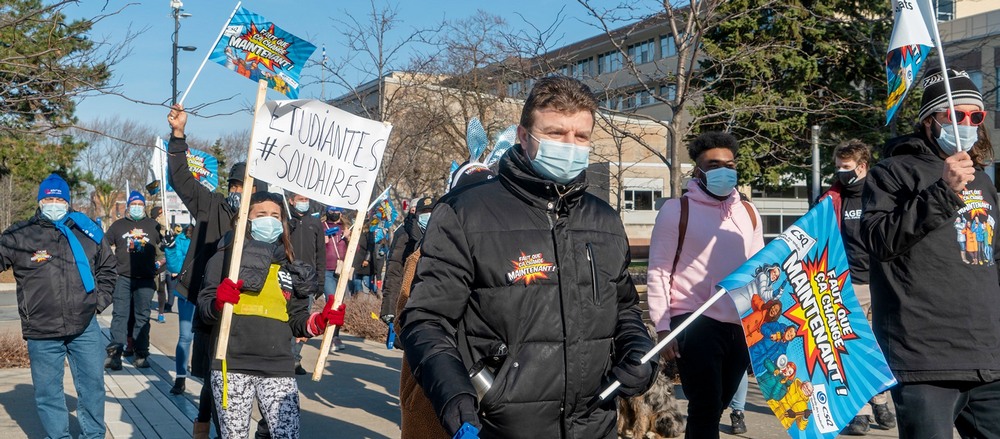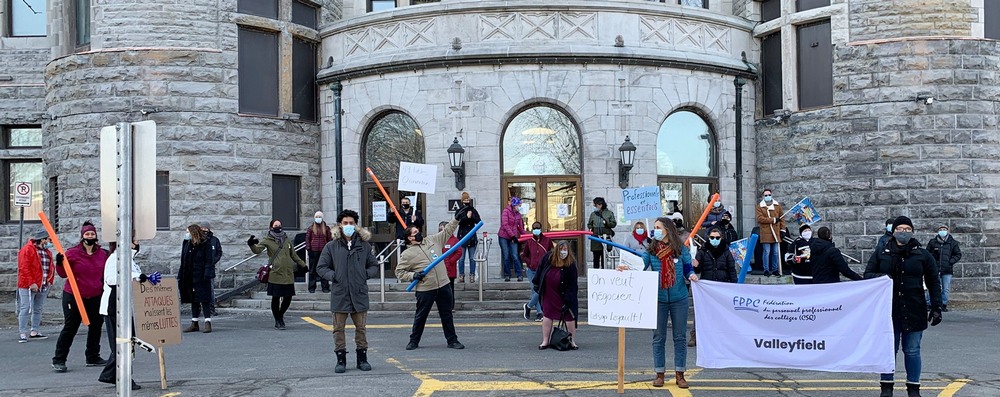April 14, 2021 - No. 28
Quebec
Government Presents "New Offers"
to Public Sector Workers
Abuse of
Power to Deny Workers' Needs and Their Right to Decide
- Geneviève
Royer - 
March 30 Quebec-wide day
of action "We Are Sounding the Alarm"
•
What the Government Calls "New
Offers" • Responses from Public Sector Unions
Quebec Government Presents "New Offers"
to Public Sector Workers
- Geneviève Royer
-

One-day strike at
Ahuntsic college, March 30, 2021.
The
approximately 550,000 workers in the health, education and social
services sectors in Quebec are still trying to renew their collective
agreements on the basis of demands that improve their working
conditions and the delivery of services on which the people depend, in
particular in tackling the spread of COVID-19.
They've had more than their fill of being humiliated at so-called
bargaining tables, particularly as their demands are so critical for
themselves and for the people.  On
March 30, college-sector unions affiliated with the Quebec
Labour Congress (CSQ) staged their first one-day strike
action. On
March 30, college-sector unions affiliated with the Quebec
Labour Congress (CSQ) staged their first one-day strike
action.
The following day, public sector union
workers -- one year after the
expiry of their contract -- held a national day of action with the
theme "We're sounding the alarm." That same day, March 31, Sonia LeBel,
the Minister responsible for Government Administration and the Treasury
Board Chair, presented at a press conference what she called
her new offers and said that "for the first time, the government is
dedicating specific amounts to sectoral issues in its negotiations."
In fact, the press conference was another attempt to wreck
public
opinion, with the Minister claiming that the government is doing
everything to resolve the public sector crisis and that the unions lack
social solidarity. She began her press briefing by
pointing out that the 550,000 public
sector workers provide essential services to the people of Quebec. In
the same breath she said, "the total compensation package for
government employees amounts to approximately $40 billion, or nearly 60
per cent of government program spending. Understandably the
renewal of collective agreements and the new measures set up as a
result have a major impact on Quebec's budget plan." She added,
"each increase of one per cent is equivalent to a recurring spending
increase of $400 million." It's the same mantra
that has been bandied about by neo-liberal
governments for over 30 years, which has deepened the crisis in social
programs and public services as they are regarded as a cost to society
and not as an extraordinary contribution to the economy that immensely
humanizes society. In fact, the Minister has no
intention of discussing the economy or
public finances or of mobilizing the revenues needed to adequately
invest in the services and the workers who provide them. She neither
sees nor proposes any alternative to an economy that pays the rich,
where the value created by social programs and public services is not
repaid by the large private interests who are provided, free of charge,
with a healthy and educated workforce, not to mention the billions they
derive in private profits from their control of such services. Workers
have many proposals, such as restricting private profit in the services
that are being deprived of vital income. However, such proposals
are rejected out of hand. Talk of Quebeckers'
"ability to pay" happens only when workers claim
wages and conditions that are acceptable to them and that improve the
delivery of services. Who knows, maybe Quebeckers
don't have the ability to pay for
vaccines or personal protective equipment either? This "ability to pay"
argument is shameful because it ignores the needs of the people and
society which must be met and the public discussion on how to go about
doing so. It negates the human factor/social consciousness that
must be deployed to develop pro-social solutions, which begin with
workers' resistance to the anti-social offensive and putting forward
their claims by speaking in their own name. The
Minister's press conference saw the threat of working conditions
and wages for public sector employees being decreed once again. Asked
by a reporter about her "level of patience" with the unions and how far
she was willing to "stretch it" before making "ultimatums," the
Minister replied: "Well, you have answered your own question --
as quickly as possible. That's the message I gave to the union leaders.
[...] I think, it's in everyone's interest to settle quickly, as
quickly as possible [...] I still think we can have a negotiated
agreement." Governance by decree has been one of
the essential features of the
anti-social offensive for the last thirty years and more, and the
current crisis only strengthens it, depriving in particular those who
produce the goods and deliver the services of the legal space to make
their voices heard. We can only reject with
contempt such ministerial arrogance and
intensify our important struggle for a decisive say in determining the
conditions and services that we consider acceptable to ourselves and
the public. 


College-sector
unions first one-day strike action in (top to bottom) Sorel-Tracy,
Limoilou and Valleyfield, March 30, 2021

Wage increases that are being proposed by the
government remain the same -- five per cent over three years (1.75 per
cent, 1.75 per cent and 1.5 per cent). The government is adding a lump
sum of up to $400 million for recurring salary increases, providing
that the inflation rate exceeds five per cent and that the government's
forecast economic growth is met. This is not a wage increase and it
does nothing
to address the critical problem of retention and attraction of workers
into the public services, therefore it does nothing to solve the crisis
in the public services.  The
Quebec government is attempting to divert from this central problem
with a series of measures which are meant to sound good but are
themselves deceptive. The
Quebec government is attempting to divert from this central problem
with a series of measures which are meant to sound good but are
themselves deceptive.
As an example, as far as nurses
are concerned, it is proposing to
add about 5,000 full-time equivalent staff (FTEs) deployed in the
network. But the conditions are not there for workers to want to take
full-time positions because of the rule by decree that requires
mandatory overtime and having to forego statutory holidays and other
kinds of
leave when working full time. In terms of measures
for elementary and secondary teachers, the
government is entertaining some nice-sounding proposals such as
increased autonomy for educators or implementing measures to promote
educational success, but it avoids a key demand put forward by teachers
to improve learning conditions, and now also to reduce the spread of
COVID-19, which is the reduction of class sizes. This
is nice-sounding discourse to avoid meeting the demands and the
needs of the workers and of the public, starting with a negotiated real
wage increase that is included in the collective agreement, that
promotes retention and attraction of personnel.

Printed
below are responses to the government offers by a number of public
sector unions. The Confederation of National Trade
Unions (CSN) represents 160,000
public service workers. It noted that "the wage parameters remain the
same as in the last offer: 1.75 per cent in 2020, 1.75 per cent in 2021
and 1.5 per cent in 2022. The lump sums for the first and second year
are slightly increased [...] Short-lived measures will not
attract and retain employees [...] In refusing once again to take the
necessary steps to improve the networks, the Legault government is
jeopardizing services to the population. We cannot accept this."
 Danny
Roy, Vice-President of the Federation of Professionals (FP-CSN) added:
"Entire days of discussion dedicated to the implementation of solutions
to counter work overload are not reflected at all in this new offer. In
addition, there are too few additional resources to address attraction
and retention issues. This is unacceptable." Danny
Roy, Vice-President of the Federation of Professionals (FP-CSN) added:
"Entire days of discussion dedicated to the implementation of solutions
to counter work overload are not reflected at all in this new offer. In
addition, there are too few additional resources to address attraction
and retention issues. This is unacceptable."
The
Union of Quebec Government Professionals (SPGQ), made up of
20,900 public sector specialists, including 3,000 in health and
education, pointed out: "The government has offered an increase, which
could reach a maximum of one per cent over three years, that is tied to
an increase in the consumer price index. Unfortunately, this has
very little chance of materializing. Quebec's economic situation in
2021, despite the variants and the restrictions and closures still in
effect, would have to return to the level of 2019, before the pandemic.
This in our view seems unlikely. If this condition is not met, union
members will have to say goodbye to a possible increase. In short, this
proposal is nothing but hot air." SPGQ President
Line Lamarre added: "In fact, the first condition in
the economic clause reads as follows: 'if the gross domestic product
(real GDP) of Quebec as measured by Statistics Canada for the year 2021
is equal to or greater than 98.70 per cent of Quebec's actual GDP for
the year 2019.' If, and only if, this condition is met, can staff
get an increase of up to one per cent if inflation exceeds five per
cent. "The Minister also proposed lump sums for
union members [...] On the
one hand, a sum of $1,000 for the year 2020 alone is offered only to
those at the bottom rung. Many people will therefore be deprived of it.
As well, a bonus of $0.66 has also been offered for each hour worked
between April 1, 2020 and March 31, 2021. After taxes, this
represents only about $600 in members' pockets, a non-recurring amount.
Plus, this amount does not apply to the pension plan." Sonia
Éthier, President of the Quebec Labour Congress (CSQ), which
represents 200,000 workers in education, early childhood and health
care, said: "After careful analysis, we can only conclude that the
offers presented to us on Wednesday [March 31] are smoke and mirrors.
This tabling is more of a media stunt on the part of the government
than a real willingness to seriously negotiate. In fact, we have found
nothing that even remotely resembles a real openness to improving the
working conditions of our members [...] the government is inflating its
offers with hypothetical and temporary sums, but refuses to grant
significant financial margins to improve sectoral working
conditions." The Interprofessional Health Care
Federation of Quebec (FIQ) and the
Alliance of the Professional and Technical Health and Social Services
Staff (APTS), which are negotiating their salary conditions together,
also affirmed that the government is maintaining the status quo.
"One thing is clear: nothing has changed in the last 10
months. The
expectations of the 131,000 members of the APTS-FIQ alliance are high
and, for the time being, the government's proposal does not reflect any
seriousness on the part of the Treasury Board Chair or the salary
recognition these people have a right to expect. Worse still, there's
no willingness on the part of the Legault government to close the pay
gap that puts the health and social services network workers at a
disadvantage compared to other Quebec wage earners. "These
salary offers of a five per cent increase over three years,
on the table today, were rejected last spring by the delegates of the
two organizations." The APTS, which also represents
those employed by Youth Protection
Services (DPJ), working with young people and families in great
difficulty, said that the Treasury Board Chair "did not hesitate in
cutting the mobile leave needed by workers who are subjected to
violence and aggression on a daily basis and who are confronted with
nameless tragedies. And when they say they are creating a 3.5 per cent
bonus, they cleverly hide the fact that in order to take advantage of
it, workers will have to give up some of the bonuses they're already
receiving. "But that's not all, when we break down
this bonus, we see that it
is actually comprised of a permanent part of 1.5 per cent and a
temporary part of two per cent that will disappear in two years.
Through such underhanded manipulations, Ms. LeBel is contributing to
further devaluating the vital work that over 10,000 professionals and
technicians are doing with children and their families." 
(To access articles individually
click on the black headline.)
PDF
PREVIOUS
ISSUES | HOME
Website:
www.cpcml.ca
Email: office@cpcml.ca | 
